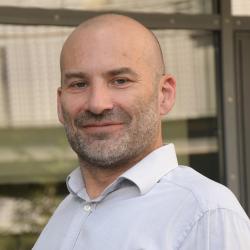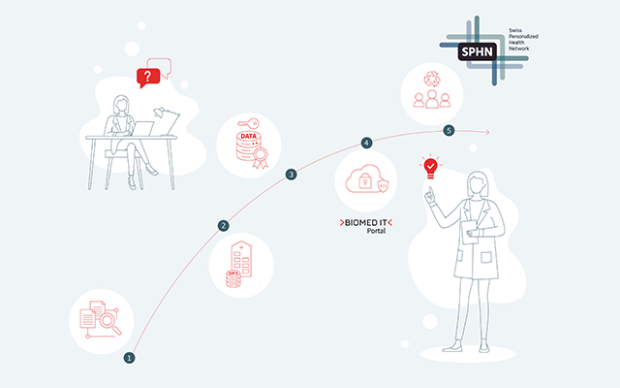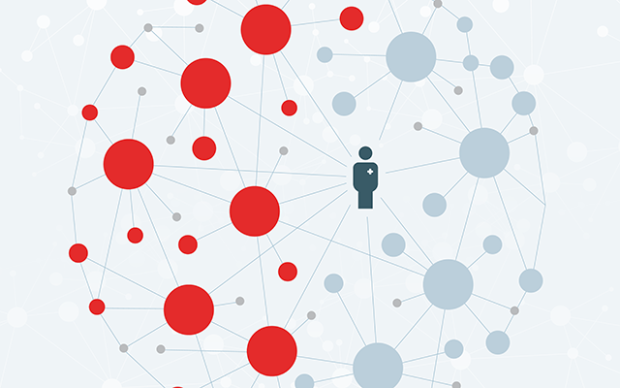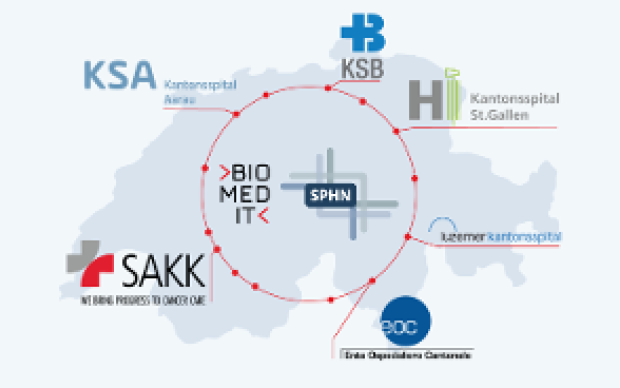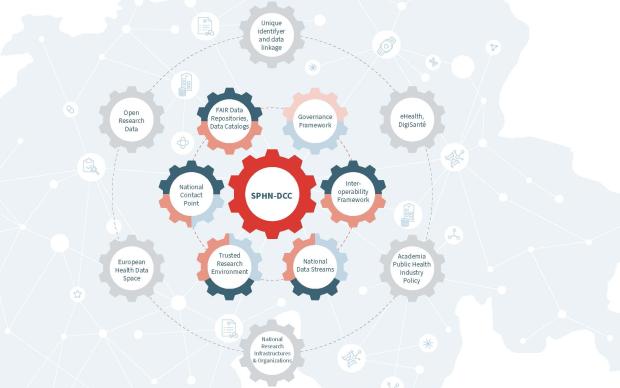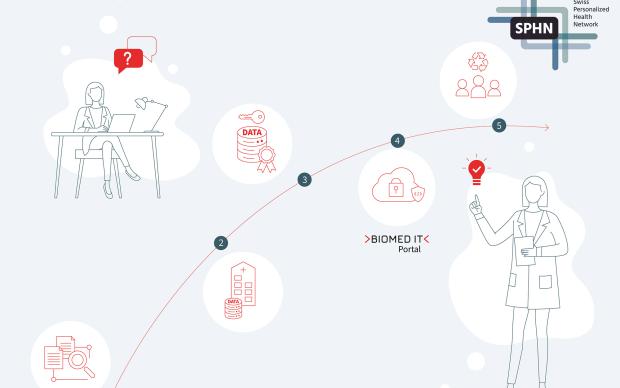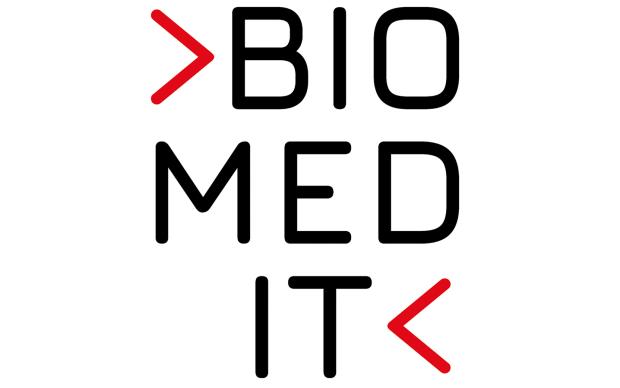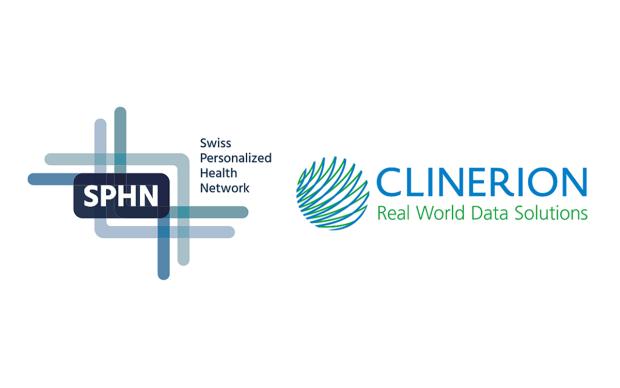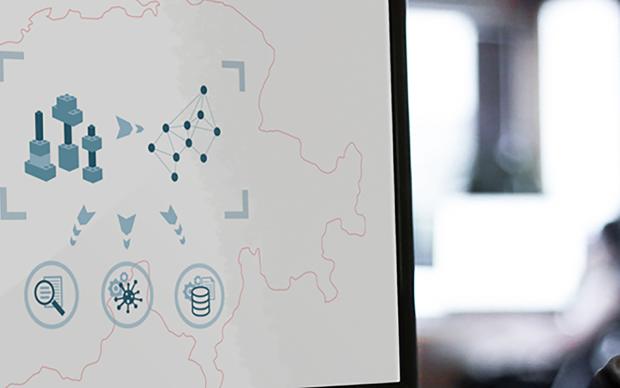Personalized healthcare requires a solid foundation; establishing interoperability of biomedical information and building a national infrastructure provides such a basis. It is with this conviction that Katrin Crameri took over the reins of SIB’s Personalized Health Informatics Group (PHI) on 1 March from Torsten Schwede, who has been appointed Vice President for Research at the University of Basel. On the occasion of this change of leadership, Torsten and Katrin shared their vision of the Group’s mandate and their common longstanding passion to make data-driven medicine a reality in Switzerland.
Katrin Crameri is a molecular biologist with a PhD in Neuroscience and a Master’s degree in Public Health. In 2007 she left the laboratory bench to become Head of the Science and Research Division of the Swiss Academy of Medical Science (SAMS). Since 2015, she has led the Centre for Analyses, Strategies and Concepts of the Division of Biomedicine at the Federal Office for Public Health (FOPH). While there, Katrin was responsible for the topic of data-driven medicine in the FOPH and represented the FOPH at the National Steering Board (NSB) of the Swiss Personalized Health Network (SPHN) Initiative.
Torsten Schwede is a Professor for structural bioinformatics at the University of Basel and since 2002 a Group leader at the SIB Swiss Institute of Bioinformatics, leading the SWISS-MODEL team. As head of sciCORE he has been coordinating the BioMedIT application for the Swiss Roadmap for Research Infrastructures. He chairs the Scientific Expert Board (SEB) of the SPHN Initiative, and over the last 3 years, set up the Personalized Health Informatics Group in Basel, managing the Data Coordination Center and the BioMedIT project. In August 2018 Torsten was appointed Vice President for Research at the University of Basel. As chair of the SPHN Scientific Expert Board, he will remain engaged in SPHN and participate as a guest at the SPHN National Steering Board.
Why has the Swiss Government decided to invest in the development of personalized health?
T.S: New technologies are about to fundamentally transform healthcare and medicine, in the fields of genetics and genomics, imaging, wearable measurement devices, and data analysis. Specific efforts are therefore necessary to translate the wealth of data produced via scientific research into medical practice and innovative treatments for the benefit of individuals. In Switzerland, characterized by a federal and decentralized health system, these efforts must go together with a nationwide harmonization of health data infrastructures, such as technology platforms and data warehouses.
K.C.: The State Secretariat for Education, Research, and Innovation (SERI) therefore identified the need for a national initiative to promote research and innovation and to strengthen Switzerland’s position in biomedical research. The Federal Office for Public Health (FOPH) then endorsed and co-mandated the initiative. It is about bringing technical progress and increased knowhow to the patient, in a timely manner. This is why the Government has decided to invest in the Swiss Personalized Health Network Initiative (SPHN).
Katrin, coming from the FOPH to head the Group in charge of the technical implementation of the initiative, what is your vision of SPHN and of your Group’s mission in this context?
K.C.: I have been aware of the SPHN initiative since its inception in 2015 and I was enthusiastic about it from the very beginning.
Rallying all decision makers around the same table enables discussions, collaborations, consensus and therefore advancement – for the greater benefit of society. Cantonal Universities, the Swiss Federal Institutes of Technology and all university hospitals and research support organizations are bringing their know-how, experience and commitment to the SPHN boards and working groups, making the scale of this collaboration truly unprecedented in Switzerland.
As mentioned by Torsten, digital technologies are transforming the health sector, and hospitals invest a great deal of money in IT infrastructure. Given the small size of our country and its decentralized structure, it makes perfect sense to streamline these developments with the aim of achieving interoperability throughout the country, in line with international efforts and requirements.
I am proud to take the lead of the group that coordinates these efforts in Switzerland and our mission is clear: through the combined know-how and expertise of all SPHN contributors we will be able to reach excellence and, through consensus, we will ensure the sustainability of all decisions and actions. The network we are building to empower personalized health research will be here to last.

A glimpse of the SPHN ecosystem
SPHN is the federal initiative aiming to bring Switzerland to the forefront of personalized health research. In 2016, the Swiss Academy of Medical Sciences (SAMS) was mandated by the State Secretariat for Education, Research, and Innovation (SERI) and by the Federal Office of Public Health (FOPH) to develop and manage the organizational structure of SPHN, while SIB was made responsible for the implementation of SPHN’s technical and data interoperability aspects. The Personalized Health Informatics (PHI) Group was created to fulfill this mandate.
The Swiss Government has allocated a total of CHF 68 million to SPHN for the period 2017-2020, of which 50 million are under the responsibility of the National Steering Board (NSB) and the SAMS, while the remainder is dedicated to the BioMedIT project placed under SIB’s responsibility. The SPHN funds which are under the responsibility of the NSB are allocated to support a) projects selected through competitive calls for proposals and b) work in the five University Hospitals to build compatible data management systems which will enable the exchange of consented patient data to meet the projects’ needs.
Coming back to your new assignment at the head of the SIB Personalized Health Informatics Group, what are the specific mandates of your group?
K.C.: The PHI Group has two main assignments. The first is the BioMedIT project, a project entrusted to SIB by the SERI, aiming at building a network of secure IT infrastructure facilities at Swiss universities and SIB. This national network will provide researchers throughout Switzerland with a secure computing environment in which confidential data, e.g. from consenting patients at Swiss University Hospitals or international consortia, can be processed without compromising data privacy.
The second key assignment of the Group is to act as the SPHN Data Coordination Centre – known as “the DCC”. The DCC focuses on the implementation of nationwide standards for data semantics and exchange mechanisms used in the current Swiss healthcare system. This is essential to make the information understandable across disciplines and places, and to enable researchers to process and interpret it. But it also raises considerable bioinformatics and IT infrastructure challenges.
To deliver on our mandates, in addition to the coordination of the BioMedIT nodes, the PHI group operates five working groups, which are strategically advising and operationally supporting the SPHN funded projects. Each working group is composed of experts in the respective fields and is in charge of a core area. Together they provide comprehensive guidance to the national initiative, and collaborate closely with the SPHN research projects.
To conclude, Torsten, as you are ‘passing the baton’ to Katrin, what is your outlook on the journey made so far and on what lies ahead?
T.S.: Every beginning has its challenges, and according to Bill Gates, we typically overestimate what we can do in one year and underestimate what we can do in ten years. Setting up solid foundations for the Group’s two mandates was crucial. We have managed to attract key experts from major research institutions and all University Hospitals to collaborate nationwide with a unique objective in mind: creating the conditions needed for the development of personalized health in Switzerland. This is already a great achievement.
In parallel to the launch of the working groups managing our advancement in key technical areas (semantic and technical interoperability, IT security, bioinformatics analytics and Hospital IT), the IT competence centers forming the BioMedIT network are supporting ongoing research projects on a day to day basis, while building up new harmonized infrastructures.
One of the big challenges for a complex enterprise such as SPHN is internal communication and coordination between the players. To this end, the PHI Group has set-up the “DCC seminar and training series”, as a best-practice repository and knowledge-sharing platform for the SPHN community.
Two years into the mandate, we are well on our way, having established collaborations through a functional governance structure and an engaged network of experts, researchers and contributors. The fantastic team at the SPHN Management office in Bern and the PHI Group in Basel, also helped to make it possible: everyone is working very hard to bring the divergent views within our network together into a shared vision for SPHN.
The foundations are there, bricklaying has started - and I leave the Group in the competent hands of someone who has believed in the cause from the very first moment and has demonstrated her abilities both in the field of biomedical research and in the Swiss public health ecosystem.
K.C.: Torsten’s contribution to the conception and realization of SPHN has been fundamental and we are grateful that he is continuing his involvement in his ongoing role as chair of the SPHN Scientific Expert Board.



